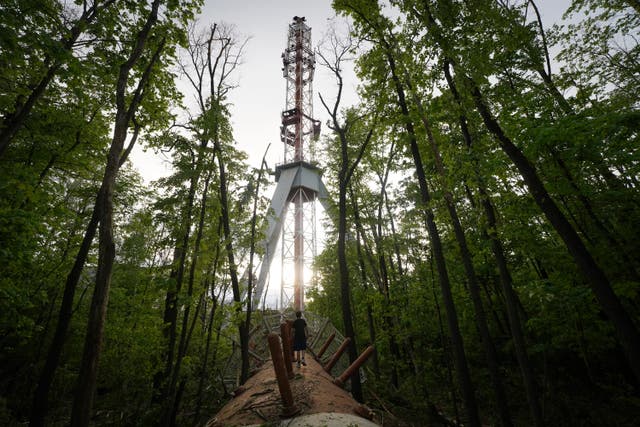Ukrainian president Volodymyr Zelensky said a Russian missile strike that smashed a television tower in Kharkiv was part of the Kremlin’s ongoing effort to intimidate Ukraine’s second-largest city, which has come under increasingly frequent attack in recent weeks .
The strike sought to “make the terror visible to the whole city and to try to limit Kharkiv’s connection and access to information”, Mr Zelensky said in a Monday evening address.
The northeastern Kharkiv region straddles the approximately 600-mile (1,000km) front line where Ukrainian and Russian forces have been locked in battle for more than two years since Moscow’s full-scale invasion of Ukraine.
The front line has changed little during a war of attrition, focused mostly on artillery, drones and trenches.
Since late March, Russia has stepped up the pressure on Kharkiv, apparently aiming to exploit Ukraine’s shortage of air defence systems. It has pounded the local power grid and hit apartment blocks.
On Monday, a Russian Kh-59 missile struck Kharkiv’s 250-metre-high (820ft) TV tower, breaking it roughly in half and halting transmissions.
A Washington think tank said Russia may be eyeing a ground assault on Kharkiv.
“The Kremlin is conducting a concerted air and information operation to destroy Kharkiv city, convince Ukrainians to flee, and internally displace millions of Ukrainians ahead of a possible future Russian offensive operation against the city or elsewhere in Ukraine,” the Institute for the Study of War (ISW) said in an assessment.
The expected arrival in Ukraine in coming weeks of new military aid from its western partners had possibly prompted Russia to escalate its attacks before the help arrived, the ISW said, adding that trying to capture Kharkiv would be “a significant challenge” for the Kremlin’s forces.
Instead, the Russian military command “may attempt to destroy Kharkiv city with air, missile, and drone strikes and prompt a large-scale internal displacement of Ukrainian civilians,” it said.
The US Senate was returning to Washington on Tuesday to vote on 61 billion US dollars (£50 billion) in war aid to Ukraine after months of delays.
Mr Zelensky said US president Joe Biden assured him the aid would include long-range and artillery capabilities.

“Four priorities are key: defence of the sky, modern artillery, long-range capacity, and to ensure that packages of American aid arrive as soon as possible,” Mr Zelensky said.
Also on Tuesday, Britain pledged £500 million in new military supplies for Ukraine, including 400 vehicles, 60 boats, 1,600 munitions and four million rounds of ammunition.
The shipment would also include British Storm Shadow long-range missiles, which have a range of about 150 miles (240km) and have proven effective at hitting Russian targets, the British Government said.
British Prime Minister Rishi Sunak spoke with Mr Zelensky on Tuesday morning to confirm the new assistance.
He was due to announce the aid later on Tuesday during a visit to Warsaw where he was meeting with Polish prime minister Donald Tusk and Nato secretary general Jens Stoltenberg.

Meanwhile, in less positive news, European Union countries with Patriot air defence systems gave no clear sign on Monday that they might be willing to send them to Ukraine, which is desperately seeking at least seven of the missile batteries.
Ukraine’s army is also heavily outnumbered in the fight, and expanding the country’s mobilisation has been a delicate issue.
Ukrainian foreign minister Dmytro Kuleba signalled on Tuesday that authorities planned to clamp down on young men of conscription age who had moved abroad, with details of the specific measures to be made public soon.
“Staying abroad does not relieve a citizen of his or her duties to the homeland,” Mr Kuleba said on the social media platform X, formerly known as Twitter.

